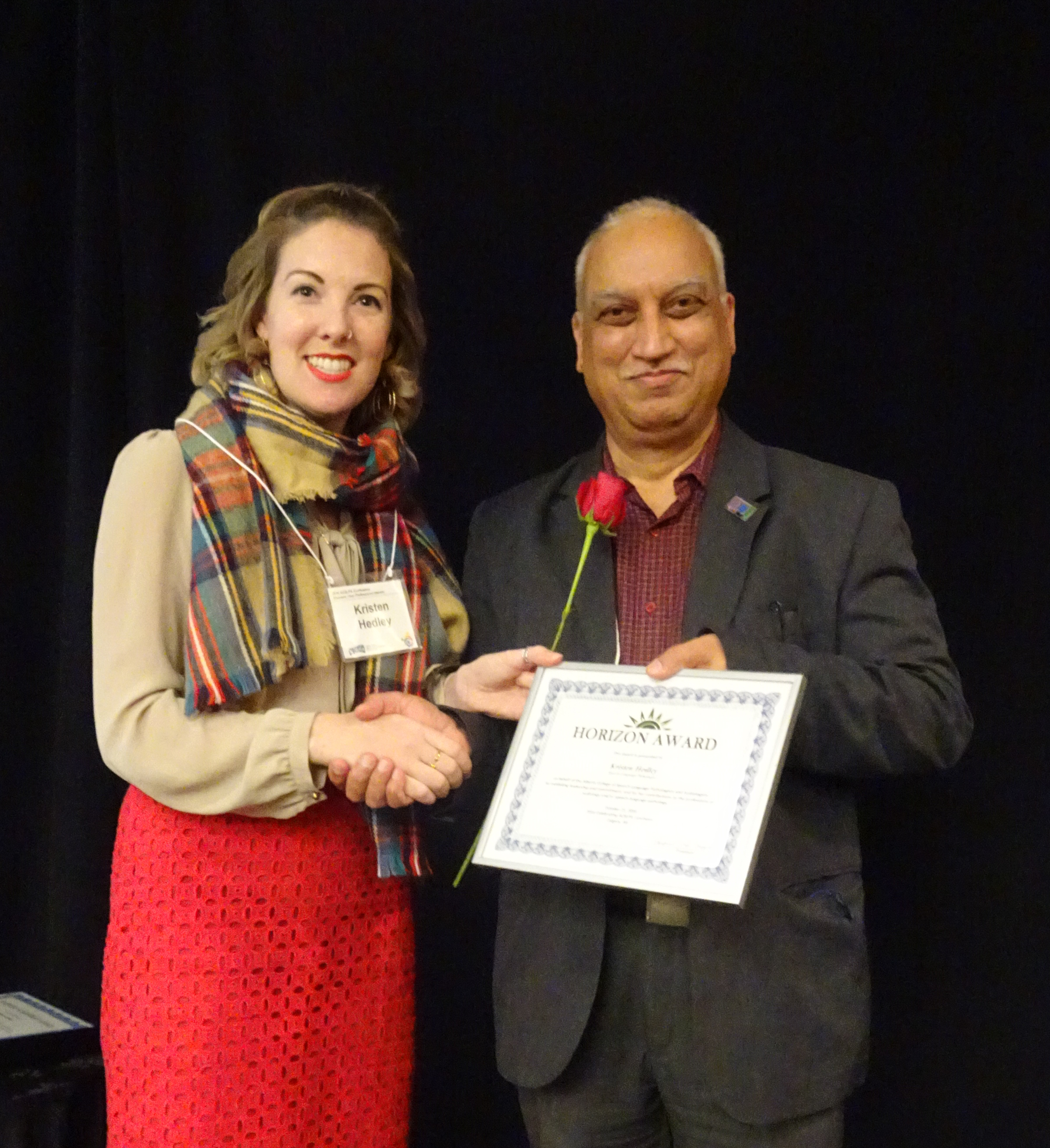
Kristen Hedley received the Horizon Award from ACSLPA. Photo Supplied.
For Kristen Hedley, being a speech-language pathologist means helping people find their voices.
"Both my siblings were in speech therapy growing up and I would go to their sessions and watch the therapist and think 'this lady has an awesome job!' That's what inspired me to become an SLP," said Hedley.
Hedley, MScSLP Class of 2012, received the 2016 Horizon Award from the Alberta College of Speech-Language Pathologists and Audiologists last month.
The Horizon Award is presented to a clinician who has made outstanding contributions to the profession in the first five years of their career. In Hedley's case, it was her dedication to educating future professionals and the innovative use of technology, like iPads, Google Drive shared folders and telehealth approaches in the delivery of therapy in rural communities, that made her stand out.
Since her graduation from the University of Alberta's Faculty of Rehabilitation Medicine, Hedley has set her sights on early education, with a focus on severe speech and language delays and disorders, and the use of technology to deliver therapy long-distance.
She started out working for the Edmonton Public School Board in preschools. "My first career was elementary teacher, so right out of grad school I was drawn to the school system. I really like preschool-age, as those kids make a lot of progress with good intervention and it is all play based--who doesn't want to get paid to play all day!" Hedley chuckled.
On top of that full-time career, Hedley agreed to take on contract work for her home community, Prairieland Regional School Division, working with pre-Kindergarten and school-aged children.
"They were in need of an SLP and it is hard to get people to work out there, so I was travelling there on my days off," said Hedley. "I'm not the type to want a nine-to-five job. I like to wear different hats at different times."
"I'm passionate about education because I know I can work with a child and do good work, but if I can empower a room full of people who work with the kids more regularly than I do to do good work, then I'm empowering agents of change, and good things will happen."
It wasn't long until she was putting the technological approaches she had learned while at the Faculty of Rehabilitation Medicine to use in her contract position.
"It's a matter of necessity. You have to be creative in a rural setting. If you set up the technology properly, it works! It's great for follow up--videos of kids' progress, videos of modelling techniques--it is a good way to coach people," explained Hedley. "Technology has always been an underlying foundation of my practice."
Hedley's dedication to the profession didn't end with two jobs. She has been supervising clinical placements since her first year in the field. For the past two years, she returned to Corbett Hall to supervise speech therapy sessions at the Corbett Clinic two afternoons per week between May and July. Recently, she joined the Department of Communication Sciences and Disorders as a child language lab coordinator.
Hedley has also been a strong advocate for educating future practitioners and the support communities of children with speech-language delays and disorders, including teachers and families. She has taught a course at the University of Alberta and has delivered several presentations to students and to Alberta teachers.
"I'm passionate about education because I know I can work with a child and do good work, but if I can empower a room full of people who work with the kids more regularly than I do to do good work, then I'm empowering agents of change, and good things will happen."
As for the Horizon Award, Hedley is honoured to have received it, and is thankful to Lu-Anne McFarlane, associate chair and academic coordinator of clinical education in the Department of Communication Sciences and Disorders, for nominating her.
"I think the nomination itself, coming from CSD department, felt like I already won. I've learned working here that when people appreciate and recognize your skills, formally or informally, it makes a difference to your practice and really fosters your desire to come to work every day."